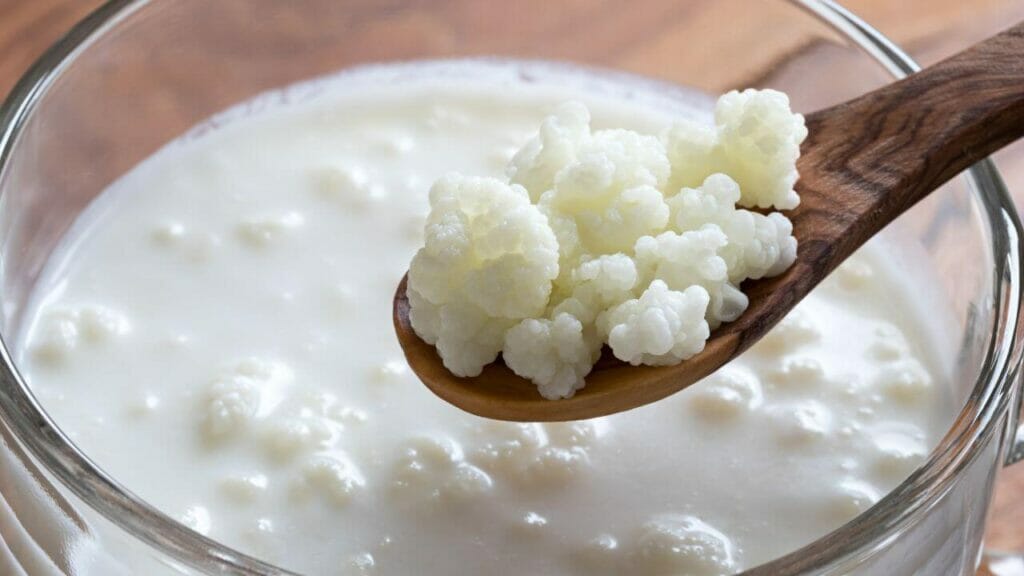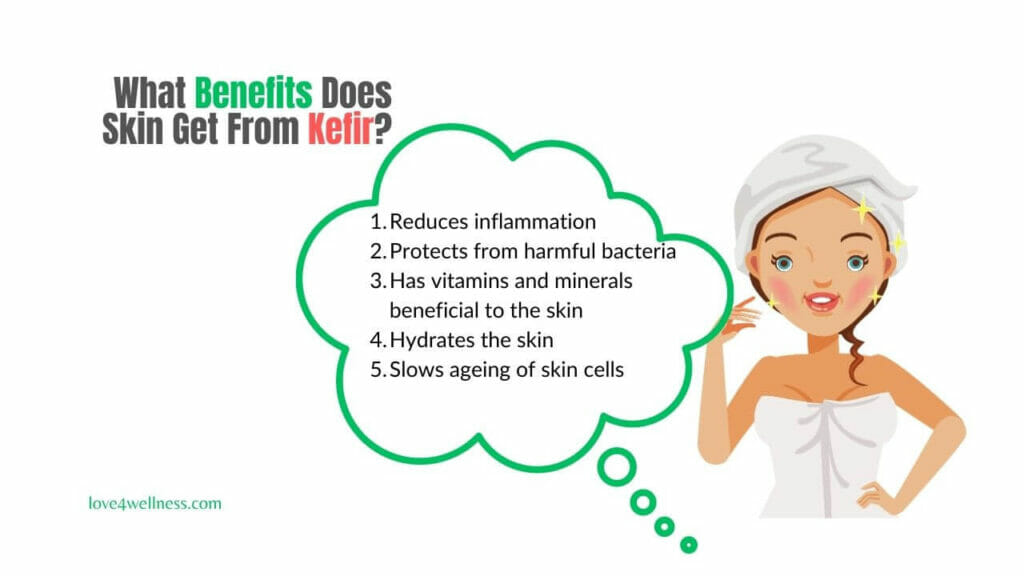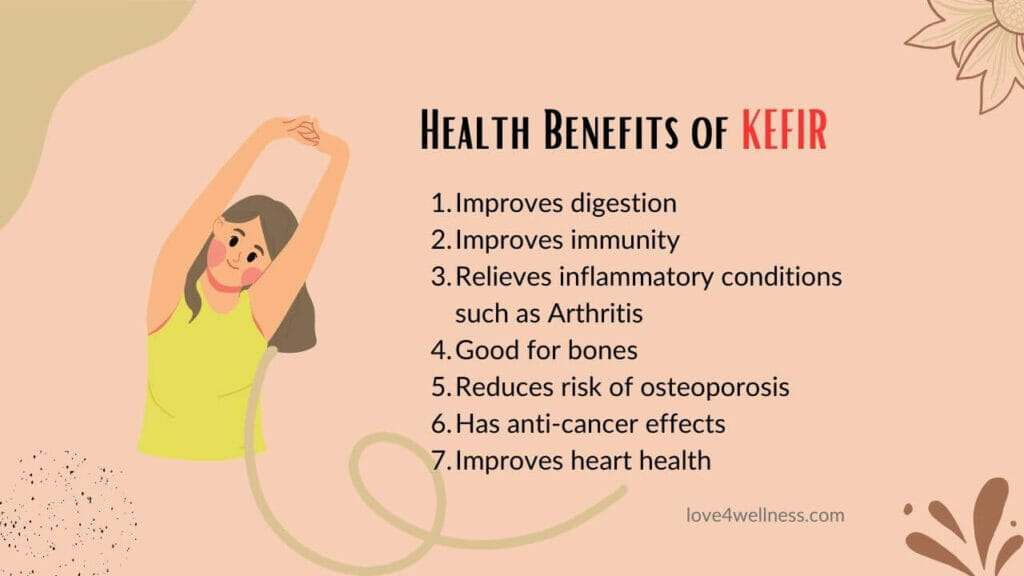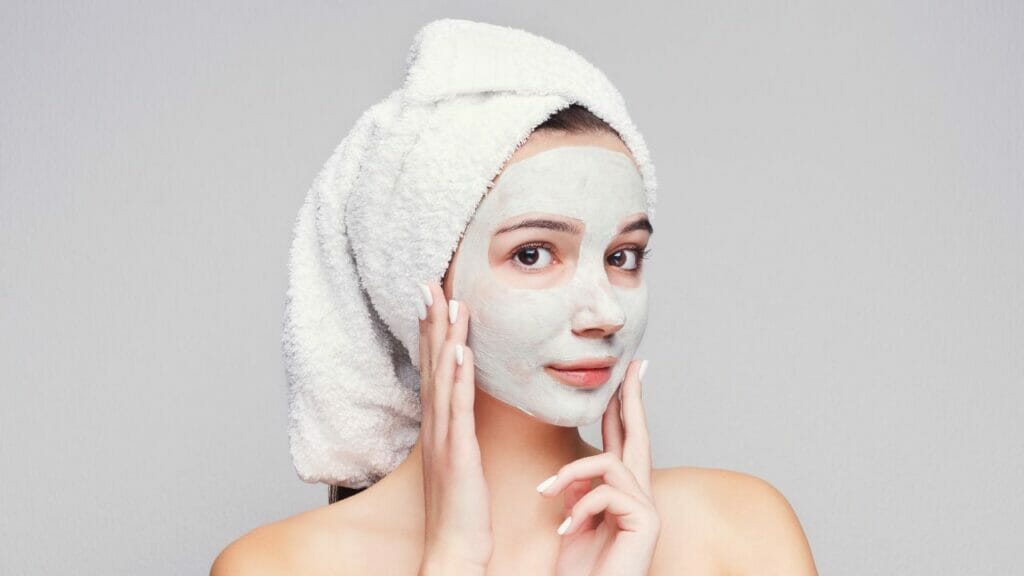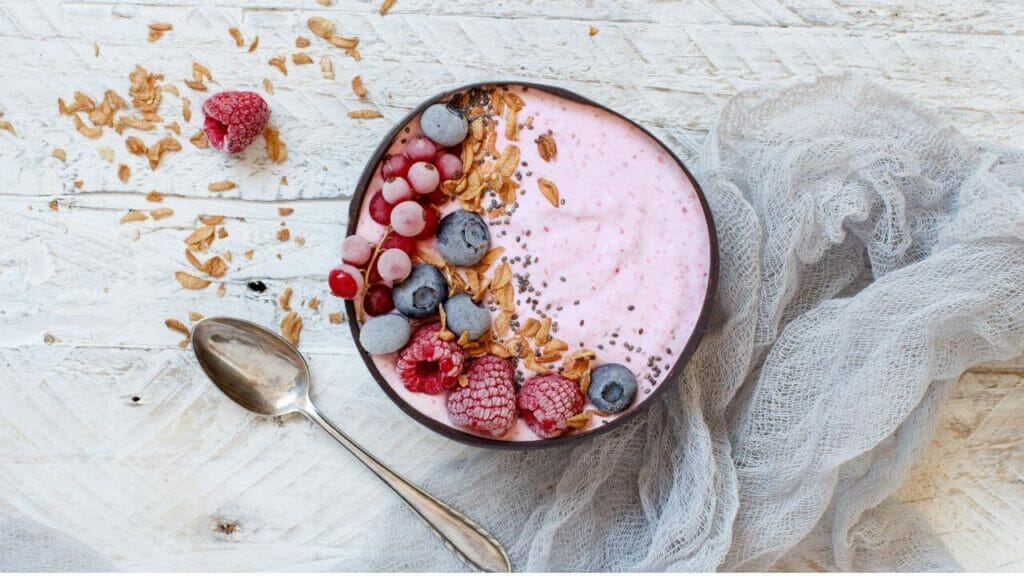Kefir is yet another magic kitchen element capable of wonders for your skin. And yes, many such magicians are tucking quietly in your kitchen counters – turmeric, yogurt, honey, and besan, to name a few. Kefir is a fermented milk drink with medicinal qualities and many health benefits. Consuming this drink is a worthwhile healthy habit. The medicinal properties help your skin look radiant, age slowly and can even help heal skin from certain skin conditions. Couple that, you can also use kefir topically on your skin and hair and see them glowing from both the inside and outside! Not cosmetic benefits alone, Kefir improves several other aspects of your health.
What is Kefir?
Kefir has origins that lie somewhere in the Caucasus Mountains of Eastern Europe. It is made by adding kefir grains, a combination of bacteria and yeast cultures, to cow’s milk or goat’s milk. You can also make it with non-dairy alternatives, such as coconut or almond milk, for those lactose intolerant or following a vegan diet.
The grains ferment the milk, producing a slightly tangy, effervescent drink rich in probiotics, vitamins, and minerals.
Kefir has a slightly thick and creamy texture, much like yogurt, and can be consumed plain or flavoured with fruit, honey, or other sweeteners. It is often touted for its health benefits, including improved digestion, immune system support, and potential anti-inflammatory effects.
Kefir – Potential benefits for the skin
Including kefir in your diet can improve skin health immensely due to the following medicinal qualities.
1. Anti-inflammatory properties
Kefir contains compounds that help reduce inflammation and hence may improve acne, eczema, and psoriasis.
2. Probiotics
Your skin flora contains millions of microbes colonised on the skin. Like your gut microbiome, your skin microbiome also is unique for every person and does a lot of good to your skin. Being a fermented food, kefir is a rich source of probiotics and has beneficial bacteria that support the health of the skin microbiome. A healthy microbiome can help to keep the skin hydrated and reduce inflammation. Also, the antimicrobial qualities make it a barrier to several harmful pathogens.
3. Vitamins and minerals
Kefir is a great source of vitamins and minerals, including vitamin D, calcium, and magnesium, which are important for healthy skin. Vitamin D has anti-inflammatory properties that may help in conditions such as acne, eczema, psoriasis, dryness of skin, etc. Magnesium lowers stress hormones and improves cellular processes, helping to rejuvenate skin. Calcium is a mineral that supports healing and also replaces old skin cells with new ones.
4. Moisturising properties
Kefir contains lactic acid, which exfoliates the skin and helps improve its texture. It also has moisturising properties that help keep the skin hydrated and prevent dryness.
5. Anti-ageing properties
Some studies have suggested that kefir may have anti-ageing properties due to its antioxidant content. Antioxidants also protect the skin against damage from free radicals, which lead to premature ageing.
Other health benefits of Kefir
Kefir contains various vitamins and minerals, including vitamin B12, calcium, and magnesium, making it a nutritious addition to the diet. The following are other health benefits you get by consuming kefir.
i) Improved digestion
Some foods may disrupt the balance in your gut microbiome, which can slow down digestion. Kefir is rich in probiotics, which are bacteria that improve digestive health. Hence, consuming kefir regularly may help to alleviate symptoms of digestive issues, including bloating, gas, and constipation.
ii) Enhanced immune function
The probiotics in kefir also help to support the immune system by encouraging the growth of beneficial bacteria in the gut. Also, the antibacterial properties improve the body’s ability to fight infections.
iii) Potential anti-inflammatory effects
The anti-inflammatory properties help reduce inflammation and alleviate symptoms of conditions such as diabetes and arthritis.
iv) Improved bone health
Kefir is a good source of calcium and vitamin D, both necessary to strengthen your bones. Further, it may help reduce the risk of osteoporosis and other bone-related conditions.
v) Potential anti-cancer effects
Kefir has peptides and polysaccharides that may aid apoptosis in tumour cells and also inhibit the proliferation of cancer cells. Further, some studies suggest that kefir may have anti-cancer properties due to its antioxidant content.
vi) Lowered risk of heart disease
Consuming unhealthy fats and processed foods high in sodium may cause high cholesterol and hypertension, damaging heart health. Some studies suggest consuming kefir can help lower cholesterol levels and triglycerides in the blood by improving fat metabolism. Interestingly, changes in the gut microbiota with regular kefir consumption positively impacted blood pressure, with both systolic and diastolic pressure showing a significant decrease. Hence, kefir can enhance heart health.
Kefir face masks – How to use kefir on the skin?
For oily and acne-prone skin:
- Apply kefir as a face mask
- Then, leave it to dry for 10 minutes
- Wash with lukewarm water and pat dry
This mask can be used daily. It is refreshing and soothing to the skin and does not rob of natural oils from your skin.
For dry skin:
- Mix two parts kefir with 1 part olive oil and egg yolk
- Apply as a mask and leave for 15 minutes
- Wash with lukewarm water and then with cold water
This mask restores the skin’s moisture and can be used once a week.
For normal to combination skin:
- Grate a small cucumber and strain the juice.
- Mix this juice with an equal amount of kefir
- Apply as a mask and let it sit for 15 minutes
- Wash with warm water and then pat dry
This mask is extremely refreshing, and your skin feels baby soft and is safe to be used daily.
A kefir recipe to treat your taste buds
Before you go, here is a fun, simple kefir recipe you can try:
Kefir and Berry Smoothie
Ingredients:
- 1 cup of kefir
- 1/2 cup of mixed berries (fresh or frozen)
- 1 banana
- 1 tbsp of honey (optional)
Instructions:
- Combine all ingredients in a blender.
- Blend until smooth.
- Pour into a glass and enjoy!
You can also use your favourite fruits or add other ingredients, such as spinach or almond butter. Depending on your taste preferences, you can adjust the sweetness by adding more or less honey. This kefir smoothie is a refreshing and healthy snack you can consume any time of the day!
That brings us to the end of the article, and we hope you know a fair deal about kefir and are convinced to use kefir as often as possible. Now the million dollar question – where to get kefir grains from? But don’t worry. You can get them and even goat’s milk from online stores, including Amazon.
Images: canva.com

